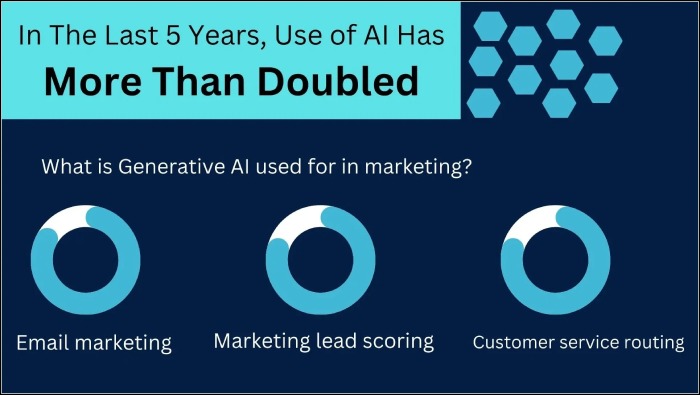Using generative AI for writing emails has proved extremely handy for businesses because it saves time and human labor. But it has limitations that can be risky for organizations on the business, society, and cybersecurity fronts.
Using AI for almost everything has become a trend today. But is it something new? Have we not looked up the Google search engine whenever we need any information?
So what does generative AI do when we pose a specific question? It does the same by searching for answers from the internet and presenting them in a cohesive form that we can directly use in our communication. Therefore, it has made things easy for us but requires paying the price, which is why writing emails using generative AI can be risky. This article dwells on these aspects in detail.
The Benefits of Using Generative AI for writing emails
Before we discuss the risks of using generative AI to write emails, here are its benefits.
- Improve the quality of your writing.
- Build better email templates and use them well.
- Mimic the trends of well-performing emails to improve the open email rate.
- Use precise subject lines to catch the consumer’s attention quickly.
- Personalize the email content to connect with customers better.
- Save valuable time, which can be utilized for more creative work.
- Analyze email data and improve your email marketing campaigns.
If using generative AI for emails can be beneficial, what could be the risks of doing so? Let us discuss them here.
Risks of using Generative AI for writing emails
Using generative AI for writing emails makes it simple, but the risks associated with it are many.
- Security and privacy issues – Generative AI accesses data from multiple sources on the internet to create email content. But it is challenging to ensure that it has authorized access to data. Therefore, there is no guarantee that it does not abuse personal information or use stolen data for creating your emails. In addition, there are instances of technology being used for sinister surveillance. Besides security issues, there can be legal repercussions of using generative AI for creating email content.
- Risk of false or inaccurate information – AI uses multiple data sets to collect information for generating your email content. But we cannot know whether the information collected is genuine or accurate. It can contain obsolete and deficient information. As a result, it can affect the email message’s interpretations, spreading false information and creating unnecessary misunderstandings. In such cases, running the text through an AI detector can help identify content that feels unreliable before it reaches customers. One way to reduce such risks is by creating and fine-tuning custom LLMs, which allows businesses to align AI outputs more closely with trusted, domain-specific data. Another simple way is to rewrite text before sending it out, ensuring clarity and accuracy.
- Lack of trustworthiness – Generative AI, for its utility, can generate email content that can look robotic or unrealistic. These messages usually lack the human touch, whereby readers might find them unacceptable. AI-generated email responses do not evoke the kind of trust that emails written by humans do. That can affect the quality of communication and create trust issues.
- Risk of being treated as spam – AI-generated email content can look very formal and risk being classified as spam by email filters. Besides, the monotonous tone appeals to malicious actors for creating phishing emails. As a result, it can compromise the information network systems and lead to cyber-attacks. On the other hand, if the copy generated by the AI has been used previously and you have not checked for plagiarism, your receiver might consider them spammy if they have come across the same copy before. To avoid this, it’s helpful to run the content through a plagiarism checker to ensure originality and reduce the chance of triggering spam filters.
- Lack of creativity – AI-generated email can create specific content that can be educational. But AI tools are limited to the information they can access. Therefore, one cannot guarantee that such communication can engage consumers better. However, a human touch can make the final product more engaging and connect with customers to build an effective email advertising campaign. So, you should humanize AI text to turn plain or robotic text into something that feels more natural and human.
- Risk of appearing prejudiced – Generative AI accesses data from multiple sources while generating email content for business email marketing campaigns. Therefore, the output quality depends on the data quality it accesses. If the AI tools access prejudiced data, they will reproduce prejudiced information that can adversely affect business prospects.
- Risk of destroying livelihoods – With more businesses depending on AI for generating emails, the risks of displacing the human workforce are higher. It can adversely affect people whose livelihoods depend on such jobs. In addition, it can have negative repercussions on society, leading to law-and-order problems.
Final Thoughts
AI, for all its creativity, ingenuity, and utility, has several drawbacks that can adversely affect businesses and their functioning. The risk of accelerating unemployment can lead to significant societal issues. Besides, the cybersecurity risks of using AI-generated emails are omnipotent.
While AI-generated content can be helpful, it can lead to reputational losses because of credibility and trustworthiness issues. Therefore, businesses should balance the usage of generative AI for creating emails and try to give their email marketing campaigns as much human touch as possible.


